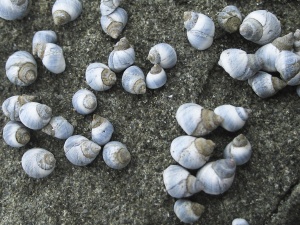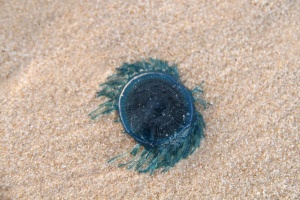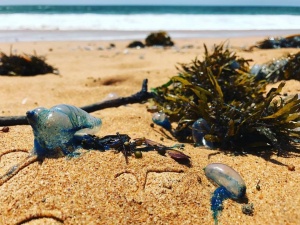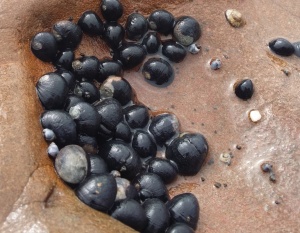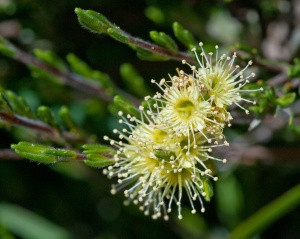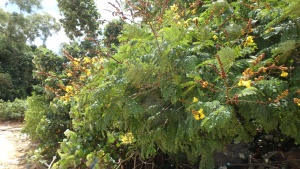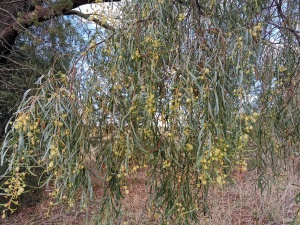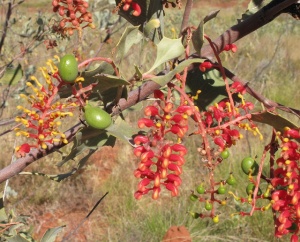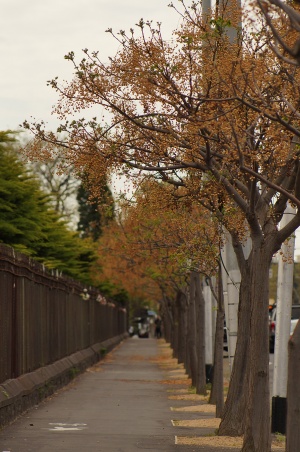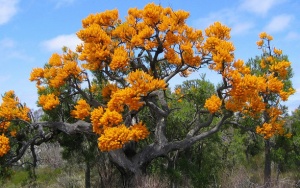Jen Sutfin
Blue Periwinkle
Small marine snails (molluscs), often called Australwinks.
They are light blue to grey in colour and have a smooth shell that spirals up to a light brown to reddish-brown sharp tip (apex).
Size
10 - 15 mm
Blue Button
It has a blue float made of a flat, circular disc with many gas-filled tubes which keep it afloat. The disc is surrounded by tiny blue tentacles.
The Blue Button is, in fact, a colony made up of different types of polyps, including some that are specialised for catching food, defense, or reproduction.
Size
Its disc is up to 2.5 cm across.
Blue Bottle
Its pear-shaped float (bottle) is a translucent blue, with a wrinkled top which might be tinged with green or pink. It has a single main tentacle, and many shorter tentacles, all of which are blue and hang from its float.
It is not a single animal but rather a colony of four kinds of individuals known as polyps. Each polyp has its own function: one is the float, another captures food, another digests the food, and another is responsible for reproduction.
Size
Float is 2 – 15 cm long, and tentacles up to 10 m.
Black Nerite
A type of marine snail (mollusc) with a distinctive round or globe-shaped shell, black or dark grey in colour. The older snails will sometime have a white patch at the flattened tip (apex) of the spirals (whorls) due to weathering.
Nerites have a white aperture (where the snail comes out) with a black rim and they usually have a black operculum (shell door or lid) which is sometimes spotted orange.
Yellow Kunzea
Erect or spreading shrub that grows up to 1 m high. Young stems of the plant are covered in small hairs.
Leaves
Branches are crowded with leaves and are arranged in more or less opposite, linear pair. Leaves are small and cylindrical in shape 3 - 8 mm long and 0.5 mm wide. Leaves are green in colour and are covered in small white hairs.
Flowers
Arranged in groups of mostly 2 or 3 near the ends of the branches. The floral cup is hairy and 3 – 4 mm long. Petals are pale yellow, more or less round and about 1.5 mm long. There are 24 - 35 stamens (pollen-bearing organs) that protrude from the flower 3.5 – 4.5 mm long.
Yellow Flame Tree
Fast growing deciduous tree that grows to 15 - 25 m tall.
Leaves
Long strips of small leaves 30 - 60 cm long.
Flowers
Bright yellow flowers with orange stamens that blossom from March to June and September to November.
Willow Wattle
Erect shrub or tree, 3 - 10 m in height, but can grow up to 20 m.
Leaves
Phyllodes (flattened leaf stems) are narrow (5 - 12 mm wide) and 5 - 17 cm long. They have a prominent central vein and a curved pointed tip.
Flowers
Pale yellow or white, and clustered in groups of 15 - 30 inflorescences. Flowers form globular balls.
Wickham’s Grevillea
It is named after John Clements Wickham, 1st lieutenant on HMS Beagle 1831-36 (Darwin's expedition), and later government resident at Moreton Bay, Queensland.
A shrub or small spindly tree. Grows 1 - 4 m tall.
Leaves
Simple 2.5 - 9 cm long and 2.5 - 5.5 cm wide. They are distinctively pruinose (frosted in appearance) and the leaf margins are serrated and prickly.
Flowers
Cream, yellow or red irregular flowers. They are mainly red in the Pilbara region.
White Cedar
Also known as Cape Lilac. It reaches maturity when it is 6 – 10 years old and lives for about 20 years.
Deciduous tree, usually 10 – 15 m high but can reach 45 m in its natural environment. Its canopy is 6 – 8 m wide.
Leaves
Bright glossy green and oval in shape, 2 – 7 cm long and 1 – 3 cm wide. They are arranged either side of a 12 – 45 cm long stem and turn yellow in late autumn before falling from the tree in winter.
Flowers
Pale purple to white, star-shaped, forming clusters that are 10 – 20 cm long. Each individual flower is about 2 cm in diameter and consists of 5 petals. The flowers have a chocolate scent!
WA Christmas Tree
The Latin name Nuytsia comes from Pieter Nuyts, a member of the Council of Dutch Indies and a 17th century explorer in South Western Australia.
Tree or shrub, up to 10 m high.
Leaves
Long thin leaves.
Flowers
Orange with more stamens than petals.

